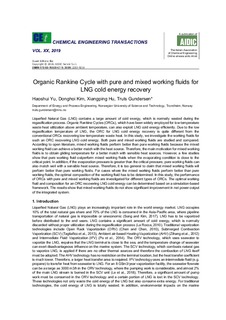| dc.description.abstract | Liquefied Natural Gas (LNG) contains a large amount of cold exergy, which is normally wasted during the regasification process. Organic Rankine Cycles (ORCs), which have been widely employed for low-temperature waste heat utilization above ambient temperature, can also exploit LNG cold energy efficiently. Due to the low regasification temperature of LNG, the ORC for LNG cold energy recovery is quite different from the conventional ORCs recovering low-temperature waste heat. In this study, we investigate the working fluids for such an ORC recovering LNG cold energy. Both pure and mixed working fluids are studied and compared. According to open literature, mixed working fluids perform better than pure working fluids because the mixed working fluid can achieve a better match with the heat source. Therefore, the main motivation for mixed working fluids is to obtain gliding temperature for a better match with sensible heat sources. However, a few studies show that pure working fluid outperform mixed working fluids when the evaporating condition is close to the critical point. In addition, if the evaporation pressure is greater than the critical pressure, pure working fluids can also match well with a sensible heat source. Therefore, it is too general to claim that mixed working fluids will perform better than pure working fluids. For cases where the mixed working fluids perform better than pure working fluids, the optimal composition of the working fluid has to be determined. In this study, the performance of ORCs with pure and mixed working fluids are investigated for different types of ORCs. The optimal working fluid and composition for an ORC recovering LNG cold energy can be determined based on a simulation-based framework. The results show that mixed working fluids do not show significant improvement in net power output of the integrated system. | nb_NO |
